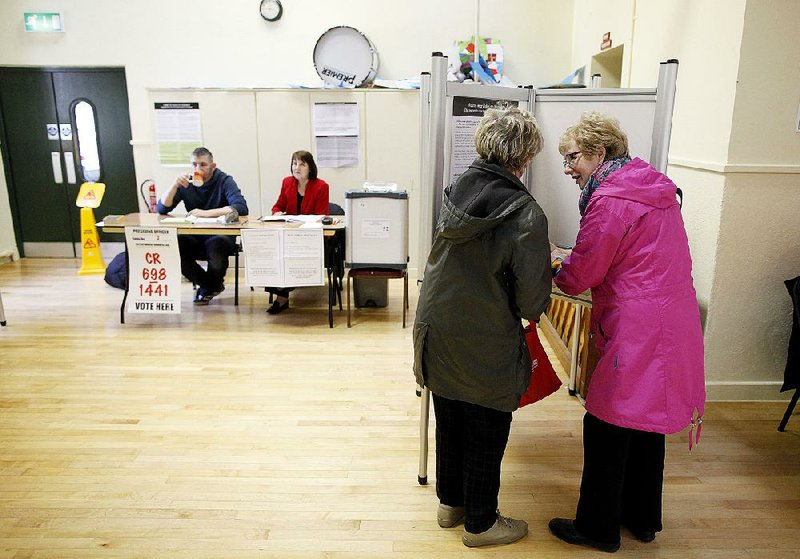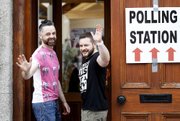DUBLIN -- Irish citizens were flying back to their home country Friday from places as far-flung as Australia and California to cast ballots in a referendum on same-sex marriage.
If passed, it would make Ireland the first country to adopt gay marriage by a popular vote.
A social-media campaign in support of same-sex marriage aimed at Irish citizens abroad urged them to go home for the vote, and a stream of expatriates answered the call in airports around the country. Voting is allowed only in Ireland; it is not possible to mail ballots from abroad.
A carriage filled with supporters of same-sex marriage and adorned with balloons with the word "love" made its way from London to Holyhead, Wales, where would-be voters then journeyed by boat to Dublin.
Younger voters, in particular, said they were enthusiastic about casting ballots on the issue. The referendum campaign has exposed a generational divide, as well as a breach with a national past that was deeply conservative and influenced by the Roman Catholic Church.
Other countries, including the United States, are grappling with how quickly to address questions like the definition of marriage and the extent to which courts and legislatures should act as catalysts for social transformation or cleave to mainstream public attitudes.
In the Irish referendum, the question before voters is whether to amend the constitution with an article stipulating that "marriage may be contracted in accordance with law by two persons without distinction as to their sex."
The polls opened at 7 a.m. Friday and were expected to close at 10 p.m. An official result was not expected before today.
Roughly 3.2 million citizens have the right to vote on the referendum. In a sign of the significance of the issue, 60,000 people have registered to vote for the first time since the general election four years ago, many of them in the past few months.
While the Catholic Church and other conservative groups have mobilized to defeat the measure, the movement has been less robust than some expected, and gay-rights campaigners see the vote as a sort of barometer for how global attitudes toward gay rights are shifting.
The Irish prime minister, Enda Kenny, a church-attending Catholic and a member of the center-right party Fine Gael, has voiced support for the amendment, as have parties across the political spectrum, including some conservatives.
Ireland's conservative streak runs deep in some quarters, though. Homosexuality was not decriminalized until 1993, and abortion is illegal unless the mother's life is at risk. The right to divorce passed narrowly in a referendum in 1995, but only after going to a second vote.
Yet attitudes have been gradually shifting as the once-overwhelming influence of the Catholic Church has waned after a series of sex-abuse scandals that rocked the church.
In recent weeks, gay-marriage supporters have sent campaigners to knock on doors across the country, buttressed by support from Irish celebrities including musician Bono, rugby star Peter O'Mahony and actor Colin Farrell. Gay-rights activists organized pub quizzes to raise money and hung rainbow flags across the capital.
The opposition has marshaled its own forces, preaching the sanctity of heterosexual unions and distributing emotive posters of an attractive man and a woman kissing their baby.
"Children deserve a mother and a father," the poster says. "Vote no."
The tactic backfired somewhat, however, when the couple pictured said they were appalled by the way the photograph was being used and that they intended to vote yes.
Archbishop Diarmuid Martin of Dublin told the state broadcaster RTE this week that he would vote no because he wanted to safeguard the definition of marriage as being between a man and a woman.
But he added that his vote was not a vote against gays.
"I think you can have equality while recognizing difference," Archbishop Martin said. "For me, the fundamental thing is marriage, and a family are about the complementary gifts of a man and a woman, a mother and a father."
The Association of Catholic Priests has urged its members not to take a stance on the referendum.
"Sexual orientation does not debar anyone from God's love," it said in a statement in March. "If, as priests, we are speaking on this matter, we need to remember that the use of intemperate language can cause deep hurt among gay people and their families, as well as doing further damage to an already ailing church."
A Section on 05/23/2015


